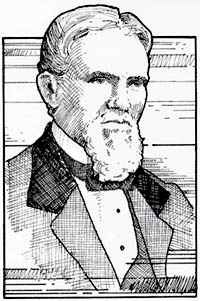Joseph R. Brown (1810-1876)
After an apprenticeship in Pawtucket (RI), Brown began to produce small tools in Providence and was briefly involved in a partnership with his father to produce and repair clocks and watches. When his father went west, Brown stayed behind and continued the shop alone, eventually taking on a local boy, Lucian Sharpe, as an apprentice.
Brown developed an automatic linear dividing machine and was able to develop and produce a small caliper that depended on main and vernier scales cut on the dividing machine. His reputation for accuracy brought a contract to build the Willcox & Gibbs sewing machines. That in turn required machine tools. He improved the turret screw machine of Frederick Howe, then he transformed the bed-type milling machines of the gun makers with a knee and column to produce the universal milling machine, making it a true tool-room machine. This was followed by a formed milling cutter for gear teeth which could be sharpened by simply grinding away the face of each cutter tooth. Finally came the universal grinding machine, completed in 1876 and, like the universal milling machine, the start of a long line of machine tools.
Elected 1982


 Machine Tool Builder
Machine Tool Builder
 Founder
Founder
 Inventor
Inventor